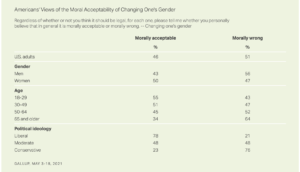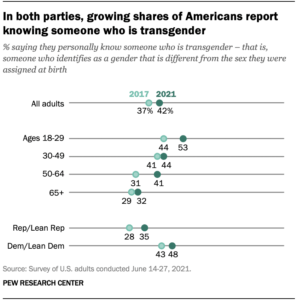American views on people who change gender are nearly as divisive as views on abortion, new polling from Gallup shows, in the first-of-its-kind research by the firm.
Gallup has tracked Americans’ views on a range of sexuality issues for the past 20 years, but this year for the first time added a question about gender identity, which is different than sexual orientation or sexuality in general.
The new data finds that changing one’s gender identity is extremely contentious, with 51% saying it is morally wrong, compared to 46% saying it is morally acceptable.
By comparison, 47% of Americans believe abortion is morally acceptable and 46% believe it is morally wrong. This issue creates the closest split among any of the 20 issues included in the annual Gallup survey on sexuality.
 There has been a shift over the past two decades, with more Americans coming to believe abortion may be morally acceptable, just as there has been a shift in American attitudes toward same-sex relations and same-sex marriage.
There has been a shift over the past two decades, with more Americans coming to believe abortion may be morally acceptable, just as there has been a shift in American attitudes toward same-sex relations and same-sex marriage.
“Transgender issues only recently emerged as a prominent topic in society, and it remains to be seen whether the public’s views about changing one’s gender will evolve in the way that their opinions of gays and lesbians did, or if they stay as polarized as abortion,” Gallup noted in its report.
That estimate is higher than some previous studies have shown. A 2017 study published by the National Institutes of Health projected that 390 adults per 100,000 identify as transgender, which equals 0.39% of the population. Another report from 2016 found that 0.6% of the American population identifies as transgender, more closely aligning with the new Gallup data.
Overall, researchers have speculated that anywhere from 0.3% to 0.6% of the population might be considered transgender. Finding an accurate estimate has been hampered by a lack of available survey data.
Meanwhile, Pew Research reports that a growing number of Americans say they know someone who is transgender or gender neutral.
 Nationwide, 42% of Americans say they personally know someone who is transgender, up 5 percentage points since 2017. And 26% say they know someone who prefers that others use gender-neutral pronouns such as “they” instead of “he” or “she” when referring to them, up from 18% in 2018.
Nationwide, 42% of Americans say they personally know someone who is transgender, up 5 percentage points since 2017. And 26% say they know someone who prefers that others use gender-neutral pronouns such as “they” instead of “he” or “she” when referring to them, up from 18% in 2018.
Illustrative of the ideological divide on transgender identity, more than half (56%) of American adults believe that whether someone is a man or a woman is determined by the sex they were assigned at birth, while 41% believe a person’s gender can be different from the sex they were assigned at birth. These figures are largely unchanged since 2017.
Acquaintance with transgender persons is not equally shared among all American subgroups. Younger adults, Democrats and those with more education are more likely to report knowing a transgender person.
Among those younger than age 30, 53% say they know a transgender person, up from 44% in 2017.
Knowing a transgender person makes a difference in attitudes about the subject. Pew found that those who report knowing someone who is transgender are significantly more likely to believe that a person’s gender can differ from their sex at birth.
Related articles:
Why being transgender is not a sin | Opinion by Mark Wingfield
Baptist minister unlikely advocate for transgender community
Trans 101 for churches: ways to make a difference for transgender persons | Opinion by Susan Shaw and Brenda McComb


